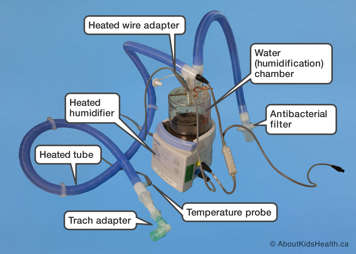Heated humidifiers are for children who use a ventilator attached to a tracheostomy tube.
How does a heated humidifier work?
The air from the ventilator passes over heated water to become warmed and humidified before it enters your child’s lungs.

How to assemble a heated humidifier circuit
Before you start
Gather your equipment and supplies:
- sterile, distilled water
- water chamber
- heated humidifier (F&P MR 850)
- ventilator and circuit (for example, Trilogy).
Assembling a heated humidifier circuit
- Wash your hands.
- Fill the water chamber with sterile distilled water.
- Slide the humidification chamber onto the base of the heated humidifier.
- Connect the bacterial filter to the outlet of the ventilator.
- Connect one side of the short ventilator tubing to the antibacterial filter.
- Connect the other side of the short tubing to one of the tubing connections on the water chamber.
- Connect one side of the long tubing to the other connection on the water chamber.
- Connect the other side of the long tubing to your child's tracheostomy adaptor.
- Turn on the humidifier, making sure that it is on the “invasive” mode at 37° C.
How to maintain a heated humidifier
As needed
- When it is dirty, clean the humidifier with a clean damp cloth and either isopropyl alcohol or dishwashing liquid.
- Replace the water chamber when it has a crack.
Daily
- Empty the water chamber if using it only at night.
Every six months
- Check the temperature probe for physical damage.
Every year
- Check the temperature cables for damage. Replace if necessary.
- Check the heater plate for deep scratching. Replace if necessary.
- Check the heater wire adaptors for damage. Replace if necessary.
Precautions
- Because of how it works, a heated humidifier can sometimes create an electric shock.
- Take care to avoid “rain out” (build-up of warm water), as it can lead to bacterial growth in the tubing.